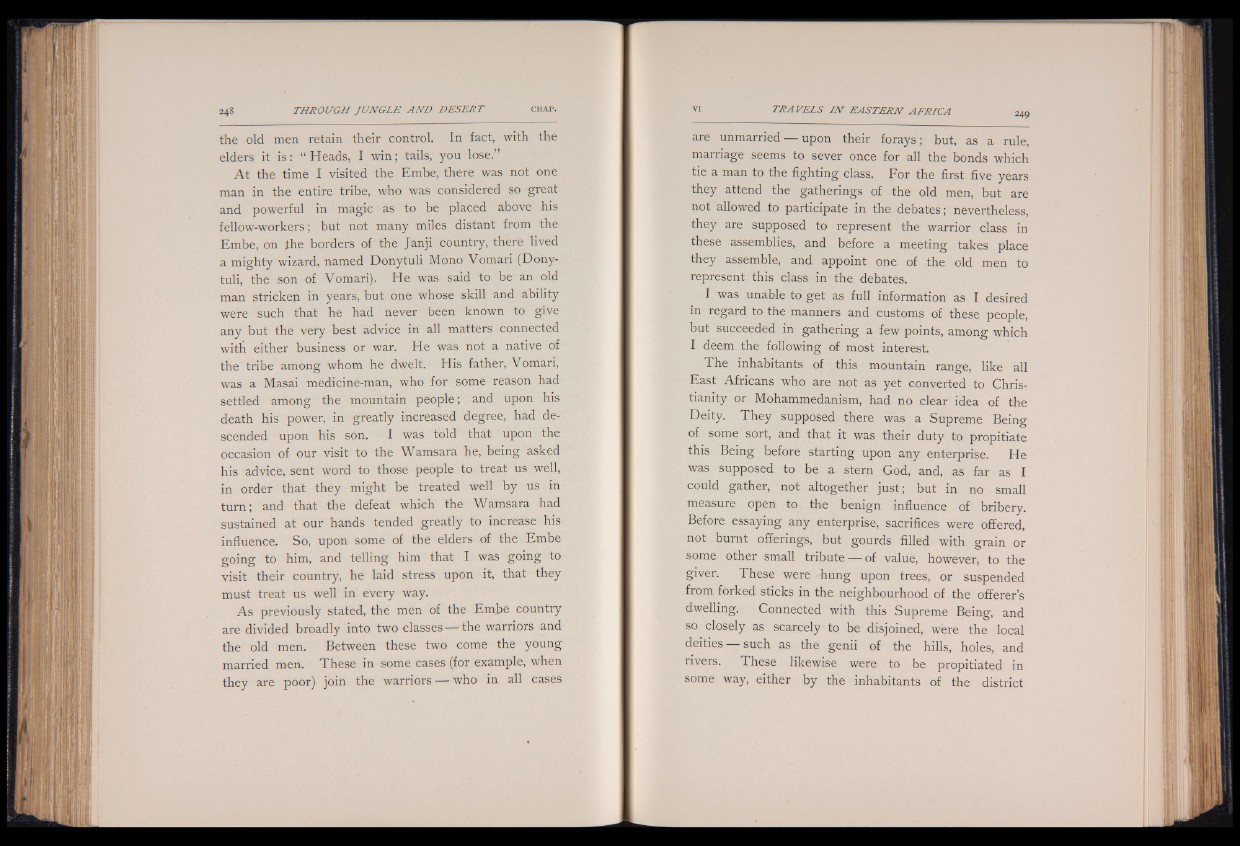
the old men retain their control. In fact, with the
elders it is: “ Heads, I win; tails, you lose.”
A t the time I visited the Embe, there was not one
man in the entire tribe, who was considered so great
and powerful in magic as to be placed above his
fellow-workers; but not many miles distant from the
Embe, on the borders of the Janji country, there lived
a mighty wizard, named Donytuli Mono Vomari (Dony-
tuli, the son of Vomari). He was said to be an old
man stricken in years, but one whose skill and ability
were such that he had never been known to give
any but the very best advice in all matters connected
with either business or war. He was not a native of
the tribe among whom he dwelt. His father, Vomari,
was a Masai medicine-man, who for some reason had
settled among the mountain people; and upon his
death his power, in greatly increased degree, had descended
upon his son. I was told that upon the
occasion of our visit to the Wamsara he, being asked
his advice, sent word to those people to treat us well,
in order that they might be treated well by us in
turn; and that the defeat which the Wamsara had
sustained at our hands tended greatly to increase his
influence. So, upon some of the elders of the Embe
going to him, and telling him that I was going to
visit their country, he laid stress upon it, that they
must treat us well in every way.
As previously stated, the men of the Embe country
are divided broadly into two classes— the warriors and
the old men. Between these two come the young
married men. These in some cases (for example, when
they are poor) join the warriors — who in all cases
are unmarried — upon their forays; but, as a rule,
marriage seems to sever once for all the bonds which
tie a man to the fighting class. For the first five years
they attend the gatherings of the old men, but are
not allowed to participate in the debates; nevertheless,
they are supposed to represent the warrior class in
these assemblies, and before a meeting takes place
they assemble, and appoint one of the old men to
represent this class in the debates.
I was unable to get as full information as I desired
in regard to the manners and customs of these people,
but succeeded in gathering a few points, among which
I deem the following of most interest.
The inhabitants of this mountain range, like all
East Africans who are not as yet converted to Christianity
or Mohammedanism, had no clear idea of the
Deity. They supposed there was a Supreme Being
of some sort, and that it was their duty to propitiate
this Being before starting upon any enterprise. He
was supposed to be a stern God, and, as far as I
could gather, not altogether just; but in no sma l l
measure open to the benign influence of bribery.
Before essaying any enterprise, sacrifices were offered,
not burnt offerings, but gourds filled with grain or
some other small tribute — of value, however, to the
giver. These were hung upon trees, or suspended
from forked sticks in the neighbourhood of the offerer’s
dwelling. Connected with this Supreme Being, and
so closely as scarcely to be disjoined, were the local
deities such as the genii of the hills, holes, and
rivers. These likewise were to be propitiated in
some way, either by the inhabitants of the district